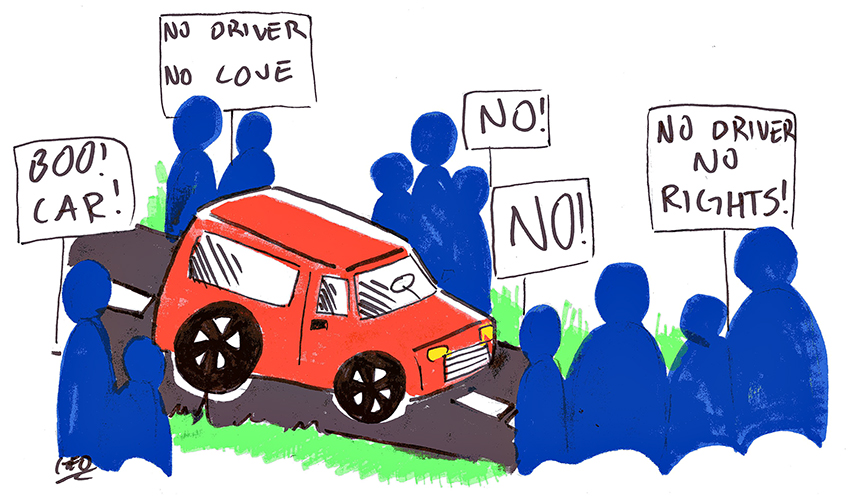Volvo and Ford recently announced that they will have autonomous vehicles in the streets in the next five years, bringing people one step closer to having their own Herbie or KITT.
Many other car manufacturers like Tesla, Audi, and BMW are also investing in autonomous vehicles, or self-driving cars. The U.S. government recently released guidelines for autonomous vehicle safety standards. Overall, the autonomous vehicle industry is booming, and some UT faculty members, as well as students like electrical engineering junior Rafael Vidal, are excited.
“Autonomous vehicles are so interesting,” Vida said. “We don’t know how they’ll work yet, but it all looks like it will improve the way we live by preventing us from getting into risky driving situations.”
Postdoctoral fellow Guni Sharon, who works in Peter Stone’s Artificial Intelligence Lab on campus, thinks the technology will impact the way we live in many other ways.
“There are some interesting impacts that autonomous vehicles will make that are less discussed,” Sharon said. “Our team in the computer science department is doing a lot of research on the smart traffic management aspect of the overall project, but there are different teams analyzing many more potential impacts: legal matters, insurance, commuting, emergency services, airlines, mechanics, and many more.”
The lead investigator on the Autonomous Vehicles project, transportation engineering professor Kara Kockelman, thinks the introduction of autonomous vehicles will be a lot more complex than just a cool new technology. According to Kockelman, there are many consequences of the technology which are important to consider, and consumers should keep expectations realistic.
“When they introduced cruise control, people thought it was cool, but then crash rates increased, which led to adaptive cruise control,” Kockelman said. “Autonomous vehicle technology can be expected to go through a similar evolutionary period, as we figure out what the imperfections are, so it’s important for people to not expect a sudden revolution.”
Kockelman explained that although some autonomous technology currently exists in cars, it is unclear how these technologies would translate in fully autonomous situations. Lane control would be difficult in areas with worn out lane lines, car manufacturers might want to protect their cars by forcing large gaps, and the weather could seriously hamper vehicles’ self-driving capabilities.
A lot of the marketing behind autonomous vehicles touts their safety benefits, like Tesla CEO Elon Musk’s recent announcement, which said that autonomous technology will make the vehicle twice as safe as a human driver.
“The crash rate may not fall for some time, during that evolutionary period, but as long as these cars bring down the overall crash rate, I think it’ll be positive,” Kockelman said. “They’ll be able to make amazing emergency saves that humans couldn’t come up with on the fly.”
Kockelman said autonomous vehicles will probably allow more people to travel, such as the elderly, children, or people with medical issues that leave them unable to drive. Also, she said the increased ease of traveling will encourage people to travel longer distances.
“If more people are driving, you start to think about things like urban sprawl, congestion, and also emissions,” Kockelman said.
According to a recent study by Kelley Blue Book, popular opinion is that autonomous vehicles will change the way we travel, but a lot of how it does so is both currently unclear and completely in our hands.
“A lot of the policies are up to us,” Kockelman said. “Who should be allowed to command these things? Should they be allowed to roam around empty, increasing traffic congestion? How would sharing and insurance work?”
Kockelman said that if all of these considerations — emissions, sprawl, age of driving, vehicle ownership — and many more are kept in mind, there is potential for autonomous vehicles to greatly improve our lives.
“This technology will change our lives, but we don’t want people to think it will be perfect, and especially not right away,” Kockelman said. “It’s a process, but the possibilities of faster, easier, and most importantly safer travel are truly exciting.”















